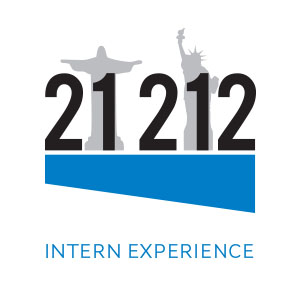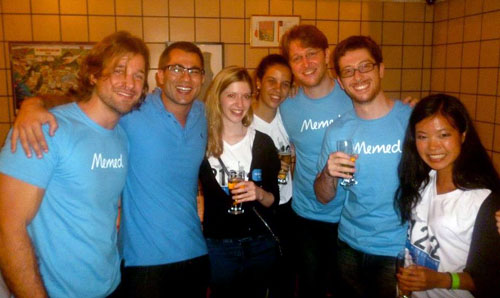The Intern Experience at 21212- with Paulina and Lilly
We recently had two summer interns, Paulina and Lilly, join us for a few months during our Acceleration Program. They both came from Dartmouth college where Paulina studies Economics and Math and Lilly, Economics and Asian Studies. They worked closely every day with the 21212 startups, sharing their knowledge, helping them develop their business models into reality, and learning for themselves what it is like to be an entrepreneur in Rio. We are always grateful for the amazing international interns that come to help us accelerate Rio! Paulina and Lilly recently returned to the US and we are happy to share some words about their experiences here at 21212.
Why did you decide to come to Brazil?
Lilly: Before coming to Brazil, I had spent time in China and found working there exciting. Brazil, with its rapid economic growth in recent years and increasing consumption, appealed to me as a business environment I wanted to learn more about. I also had never been to Latin America and wanted to take the opportunity to learn about Brazilian culture.
Paulina: My coursework inspired a keen interest in emerging markets. I decided to come to Brazil because I believe that this is a tremendous moment in its history. In Rio, the pulse of the city is palpable! So much excitement was generated over the city’s winning bid for the 2014 World Cup and the 2016 Olympics. Over the last decade, Rio and Brazil, as a whole, made tremendous progress by lifting millions of people out of poverty, cleaning up the “favelas,” and reducing violence.
What was an average day like as an intern at 21212 and what did you learn from working with the startups throughout the Acceleration Program?
Lilly: During an average day at 21212, I conducted research for product development, marketing and business development for companies in the acceleration program. I also helped the startups with their financials and participated in meetings with entrepreneurs and 21212 partners.
I saw how challenging it is to develop a great business. In Brazil, companies have to work with infrastructure that is often limited. I learned about the importance of validating the problem in the process of starting a company. By addressing a relevant problem, startups will have an easier time with customer acquisition and generating enough consumer demand for their product. Validating the problem also ensures that the startup will add value and improve people’s lives in some way by offering a solution that did not exist before. For example, GoBooks allows students to rent books, a service that makes sense and saves students money but did not exist in Brazil previously. Similarly, Monograme, an online fashion brand that offers premium basics, provides an alternative for Brazilians who are dissatisfied with the quality and style of t-shirts currently available. Selo Reserva, another e-commerce platform I worked with, provides lovers of wine and food with curated content and high-quality products in one convenient location.
Paulina: As a Business intern, I worked closely with three companies: Memed (a platform where doctors can search and prescribe medicines in Brazil), Instaquadros (an online marketplace for custom decorations based on Instagram photos), and Aentrópico (a company providing big data services to medium-sized businesses in Latin America).
At 21212, I experienced an entire 10-week acceleration cycle. When I started my internship, I worked mostly on product development and participated in many strategy meetings with 21212 partners. Midway through the internship, my responsibility shifted toward financials. I took the lead on Instaquadros. I sorted and analyzed their financial data, created key ratios so they can better understand the business, and completed 3-year projections. Towards the end of the acceleration cycle, I helped the startups get ready for Investor Day. My responsibilities included brainstorming ideas for the pitches, crafting convincing narratives, and coaching the entrepreneurs on public speaking techniques.
During the internship, I learned a great deal about competitive strategy, industry analysis, and financial modeling from the day-to-day demands. I learned even more by working with leading investors and brilliant entrepreneurs from all over the world.
Where do you think there is the most opportunity for startups in Rio?
Lilly: In the present, I think there’s plenty of room for copycats, since many internationally recognized companies lack Brazilian equivalents. Even bringing “copycat” ideas to Brazil will require adaptation to the local market and careful execution with unique considerations for Brazilian consumers.
Paulina: The Brazilian market is an incredible opportunity because of the exploding middle class consumer base and the country’s position as the “social media capital of the universe.” Most industries in Brazil are ten years behind the United States and Europe so the standard way to make a profit is to “tropicalize” successful businesses from abroad. However, the challenges are numerous, most notably the cumbersome bureaucracy, shortage of skilled labor, and undeveloped infrastructure.
The entrepreneurs I met at 21212 are passionate about their ideas and dedicated to their work. I am confident that they will overcome these challenges and lead Brazil forward. I am excited to see what the talented entrepreneurs of 21212 accomplish in the coming months and years!

